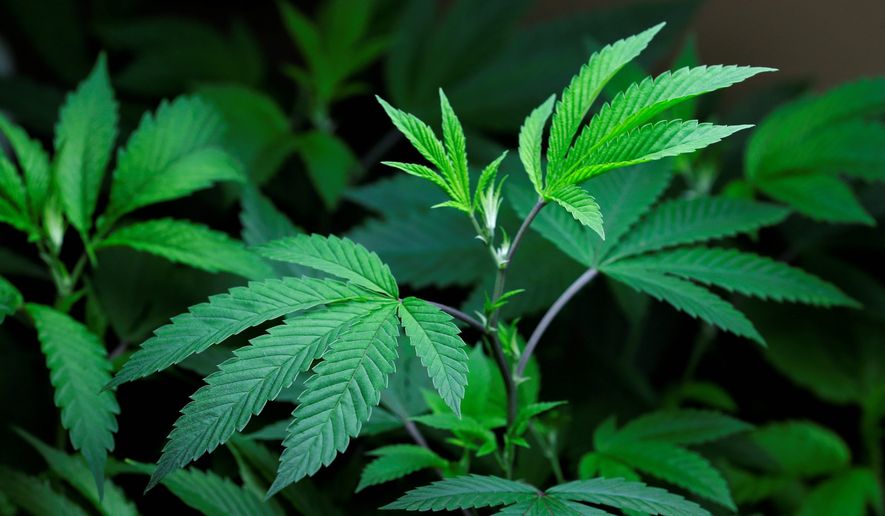A federal appeals court upheld the federal ban on the sale of guns through federally licensed firearms dealers to individuals who hold medical marijuana cards, agreeing that possession of a card gives a dealer “reasonable cause to believe” that a person is an unlawful drug user.
A Nevada woman brought the case after a gun store owner declined to sell her a firearm, citing the federal rule banning the sale of guns to illegal drug users because he knew she possessed a medical marijuana card.
A unanimous ruling Wednesday by a three-judge panel of the U.S. Court of Appeals for the 9th Circuit, based in San Francisco, upheld a lower court decision that dismissed the woman’s claims.
S. Rowan Wilson sought to buy a firearm from a gun store in the small town of Moonstone, Nevada, in 2011, several months after obtaining a medical marijuana card in the state. Gun shop owner Frederick Hauser stopped her as she was filling out required paperwork for the purchase, saying he could not sell her a firearm because he knew she had obtained a medical marijuana card.
Medical marijuana has been legalized by eight of the nine states covered by the 9th Circuit ruling — with recreational marijuana also being legal in Alaska, Washington and Oregon. But the federal government still outlaws pot as a Schedule I controlled substance.
The month before Ms. Wilson tried to make the purchase, the Bureau of Alcohol, Tobacco, Firearms and Explosives issued a memo that advised federally licensed firearms dealers not to sell guns to individuals who have medical marijuana cards.
In her failed court challenge, Ms. Wilson contended that she was not actually a marijuana user and rather had obtained the card as a political statement. As a result, the court found that Ms. Wilson did not have standing to challenge the federal government’s ban on sale of firearms to drug users because she was not one.
The court only allowed her case to challenge the notion that she could be considered a likely drug user and therefore blocked her from purchasing a firearm because she possesses a medical marijuana card.
“With respect to marijuana registry cards, there may be some small population of individuals who — although obtaining a marijuana registry card for medicinal purposes — instead hold marijuana registry cards only for expressive purposes,” Senior District Judge Jed S. Rakoff wrote for the three-judge panel. “But it is eminently reasonable for federal regulators to assume that a registry cardholder is much more likely to be a marijuana user than an individual who does not hold a registry card.”
Federal law prohibits individuals from possession of firearms under a number of circumstances, including if they are convicted felons, fugitives from justice, residents of another country in the United States illegally, have been adjudicated mentally defective or been committed to a mental institution or are unlawful users of or are addicted to marijuana, depressants, stimulants or other narcotic drugs.
A firearm transaction record, which must be filled out by a person seeking to purchase a gun from a federal firearms licensee, specifically asks potential buyers, “Are you an unlawful user of, or addicted to, marijuana, any depressant, stimulant, narcotic drug, or other controlled substance?”
The 9th Circuit agreed that such drug use “raises the risk of irrational or unpredictable behavior with which gun use should not be associated.” Despite the fact that Ms. Wilson was not a drug user, the court held that the correlation between having a card and the likelihood of using marijuana justified the extension of the ban.
“Registry cardholders are more likely to be marijuana users, and illegal drug users, including marijuana users, are more likely to be involved in violent crimes,” the 9th Circuit opinion reads. “Accordingly, preventing those individuals who firearm dealers know have registry cards from acquiring firearms furthers the Government’s interest in preventing gun violence.”
Ms. Wilson’s attorney, Chaz Rainey, told The Associated Press that he plans to appeal the case, arguing that it represents an inconsistency in applicability of the Second Amendment.
“We live in a world where having a medical marijuana card is enough to say you don’t get a gun, but if you’re on the no-fly list, your constitutional right is still protected,” Mr. Rainey told the AP.
Second Amendment expert Adam Winkler, a professor at the UCLA School of Law, said the case has limited applicability to firearms law.
“It’s a very minor case that deals only with a small number of people who have a medical marijuana card but do not use marijuana,” Mr. Winkler said. “Because she wasn’t a drug user, she couldn’t have a full frontal challenge to the ban on firearms purchases by drug users.”
The court’s opinion notes that if Ms. Wilson were to surrender her medical marijuana card, she would again be eligible to purchase a firearm.
• Andrea Noble can be reached at anoble@washingtontimes.com.




Please read our comment policy before commenting.